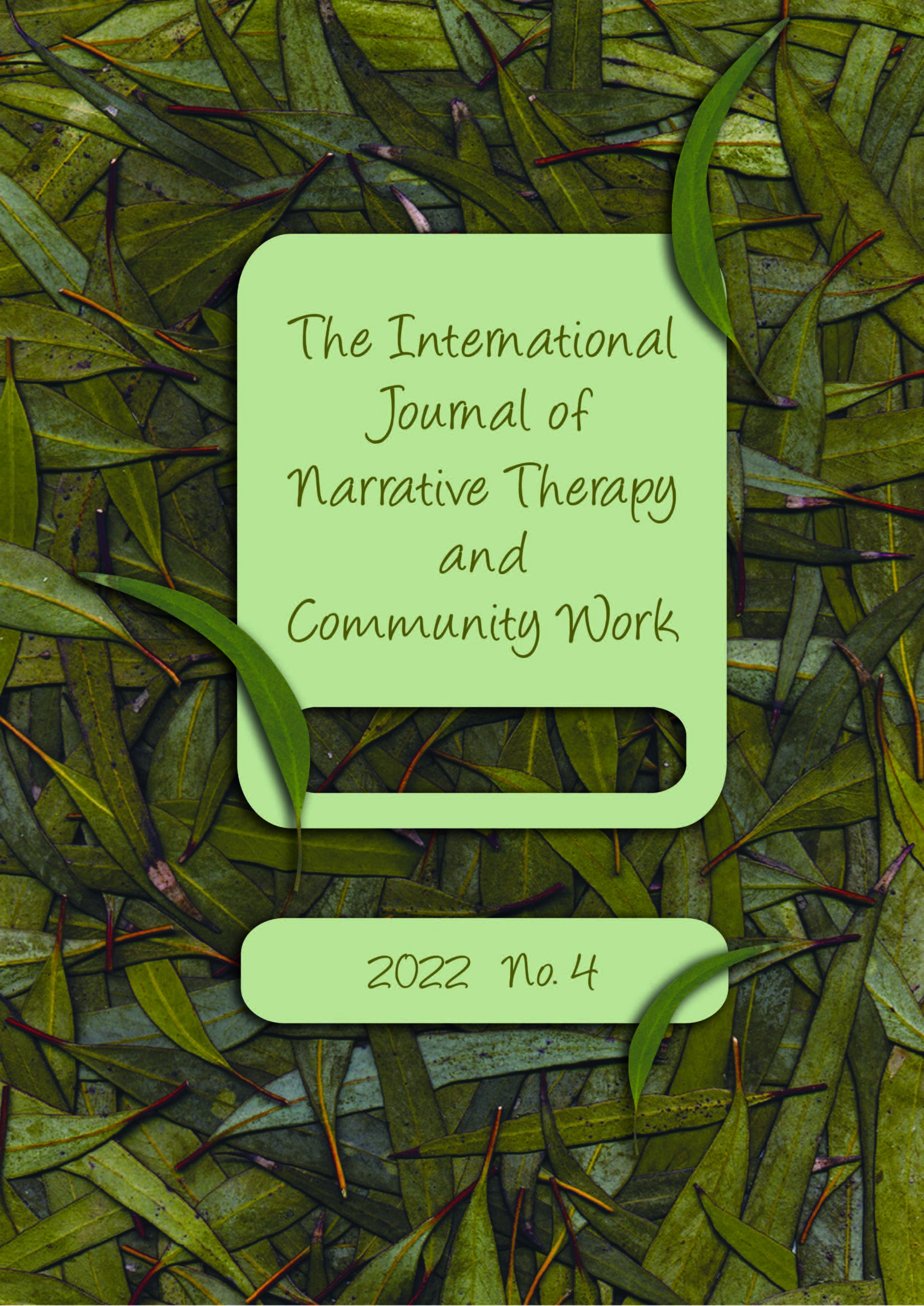2022: Issue 4
Dear Reader,
Welcome to this issue of the International Journal of Narrative Therapy and Community Work.
It features descriptions of narrative practice that are responding to current social predicaments in diverse contexts.
The first piece, by Chelsea Size, considers the confronting existential realities of the climate crisis and ways in which narrative practices can be used to help resist overwhelm and sustain climate activism. Recognising that stories shape our lives and the life of our planetary home, the paper examines both broad systemic issues and the everyday effects of living in a time of climate crisis. Recognition is given to modern/colonial ways of being and anti-colonial practices. Narrative questions are offered in connection to three themes: place, spiritualities and acts of resistance and the paper documents rich stories, insider knowledges and skills of living. It’s an offering and invitation to the field of narrative practice.
The second paper, from Joyce Ng in Hong Kong, demonstrates the application of narrative practice in supporting people to respond to the challenges associated with leaving the land we call home. It addresses different moments in the migration experience, from making the decision and preparing for departure, to finding ways to maintain connection with people and places when separated by distance. The skills and knowledge that participants developed through each of these stages were recorded in a series of collective documents that tell a different story about the resilience of Hongkongers during this period in history, and their eagerness to join with others experiencing similar predicaments. It is a poignant piece and also an example of skilled and creative practice.
We then hear from the African continent, as Caleb Wakhungu shares the facilitation guide for his approach to ‘Raising our heads above the clouds’ that has been developed in Mt Elgon, Uganda. This is followed by short stories of practice by Marie Claudine Nyirakigwene and Niyibizi Muhayimana Annociata from Rwanda, Deborah Mrema from Tanzania, and Hugo Kamya from Uganda/USA. David Denborough also offers a reflection about how this approach fosters community economy through collective narrative practice.
While these first three papers all provide responses to collective hardships and crisis, the next pieces focus more on personal/individual experience.
Following a loved one’s suicide, bereaved persons are sometimes revisited by pain in the form of intrusive imagery. Miguel Feliciano’s paper, ‘Engaging with imagery in the context of grief after suicide’ focuses on externalising intrusive imagery and also addresses the potential for imagery to be evoked to support re-membering conversations. It provides thoughtful options for counsellors in relation to how an image can become a site where new, preferred meaning can be made.
This journal issue ends with a personal testimony from Joanna Bayes, about her own experience of traumatic brain injury and then a reflection, ‘Bearing witness, externalising and re-authoring’ by Franca Butera-Prinzi, Nella Charles and Karen Story who are family therapists and members of the Acquired Brain Injury team at The Bouverie Centre in Melbourne.
With pieces from Australia, Hong Kong, Tanzania, Rwanda, Uganda, and USA; and ranging from personal testimony, counselling practice and ground-breaking collective practice, this issue provides a glimpse of the current creativities within the international field of narrative therapy and community work.
Changes coming!
After 40 years, I reckon we’re ready to hand the journal over to the next generation and so we are soon to announce some significant changes to this journal. These will include a new editor, new publishing schedule, different forms of media, and a burst of younger generational contributions. There are, however, some things that won’t change. This journal will continue to be the place to stay in touch with the latest ideas and developments in narrative practice and it will continue to approach publishing with a particular ethic and politic. This includes a transparent review process and care with the politics of representation:
We want people to have a chance to represent their own experience in the writings rather than authors representing the experiences of others. At the very least this means that, wherever appropriate, anyone referred to in the writings has a chance to read and reflect on the ways in which they have been represented.
We believe the politics and ethics of publishing are just as important as ethical/political considerations within the counselling room or in community work.
Thank you dear reader for your continuing interest in the International Journal of Narrative Therapy and Community Work. Thank you also to the contributors of papers in this particular issue. We look forward to your feedback.
With warmth,
Cheryl White

